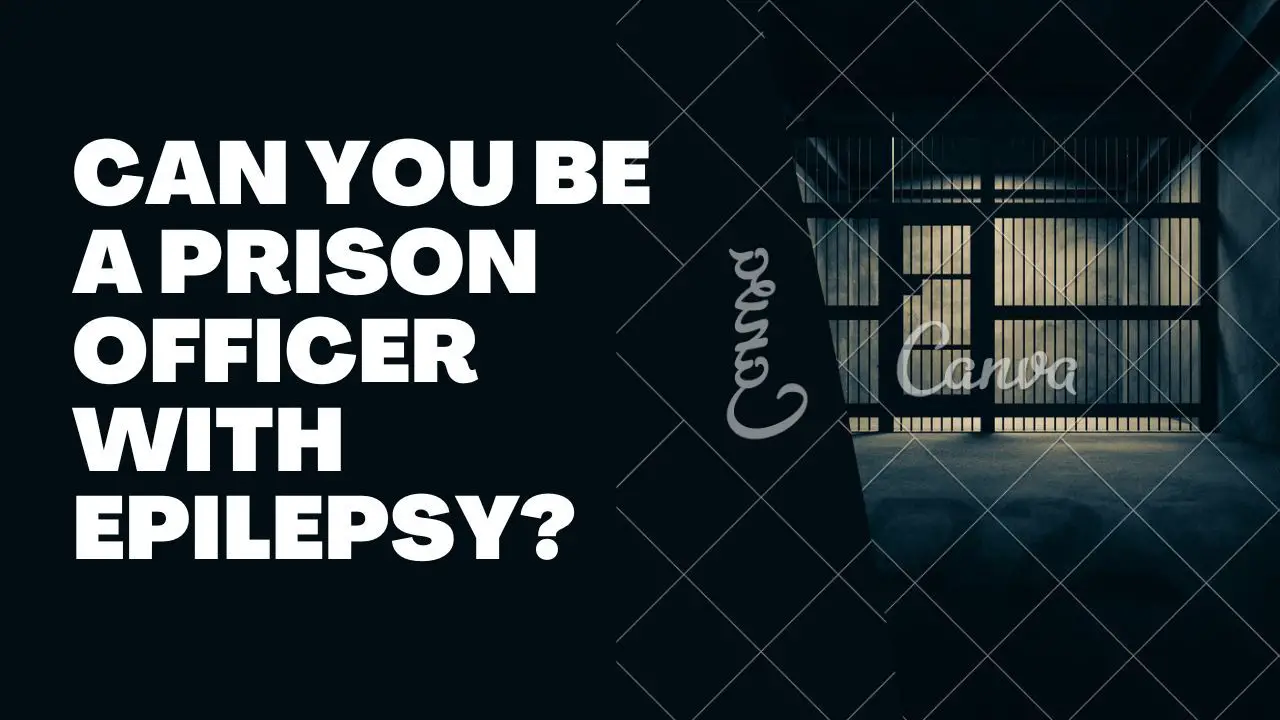Can You Be a Prison Officer With Epilepsy?
This article will explore the qualifications and job requirements for prison officers and the rights of individuals with epilepsy under federal law.

If you've ever considered a career as a prison officer but are unsure due to having epilepsy, you're not alone. Many people wonder if it's possible to pursue a law enforcement job like being a correctional officer while managing epilepsy.
This blog will explore the qualifications and job requirements for prison officers and the rights of individuals with epilepsy under federal law.
Let's dive in and answer the question, "Can you be a prison officer with epilepsy?"
What Does a Prison Officer Do?
Let's first discuss the job of a prison officer before discussing the possibility of having epilepsy. Prison guards are essential to preserving the safety and security of correctional facilities.
They intervene during emergencies, control inmate movement, conduct searches, and ensure the overall well-being of the inmates. Moreover, they supervise recreational, educational, and religious activities while maintaining order and promoting positive behavior among inmates.
Job Requirements for Becoming a Prison Officer
A background check and a minimum age of 18 are requirements for employment as a prison officer. Before being assigned to a facility, training in defensive strategies and basic first aid/CPR is imperative.
Typically, it would help if you had a high school diploma or GED, and some states may require you to finish a criminal justice degree or training course. Cognitive ability tests assess problem-solving skills and critical thinking abilities.
Physical fitness is crucial, meeting specific standards of the Department of Corrections. Tasks like push-ups, sit-ups, running assessments, climbing stairs or ladders, and lifting weights are part of the assessment.
Meeting these requirements ensures you're well-prepared for the challenges of being a prison officer and contributes to the safe and efficient functioning of correctional facilities.
Pursuing a career as a prison officer with determination and fulfilling these requirements will pave the way for a rewarding and impactful journey in law enforcement.
Understanding Epilepsy in the Workplace:
Recurrent seizures are the hallmark of the neurological condition known as epilepsy. People with epilepsy frequently wonder if they can work in certain fields, such as law enforcement.
Federal civil rights laws, particularly the Americans with Disabilities Act (ADA) of 1990, which covers prison officers, shield people with disabilities, such as epilepsy, from employment discrimination.
Read Private Prisons In The State Of Maryland
So, Can You Work as a Prison Officer with Epilepsy?
The answer is yes. You can work as a prison officer with epilepsy if your seizures are well-controlled through medication. The ADA forbids discrimination against qualified disabled people, ensuring that they have equal access to employment opportunities as everyone else.
Your epilepsy shouldn't prevent you from pursuing your career goals as long as you can complete the necessary job tasks with or without reasonable accommodations.
Epilepsy and the Law
People with epilepsy are not allowed to be discriminated against in the workplace under the Americans with Disabilities Act (ADA), which was passed in 1990. An employer cannot refuse to hire or fire an individual solely based on their disability as long as they can perform the job's essential functions with or without reasonable accommodations.
There are only two instances in which this rule cannot be applied. When a person directly endangers the health and safety of themselves or others, and when making a reasonable accommodation would place an undue burden on the employer.
To put it another way, if a person's seizures are effectively managed by medication, they might be eligible to work as a prison officer.
Read Private Prisons In The State Of Delaware
Working as a Prison Officer with Epilepsy
You might be qualified to work as a prison officer if you have epilepsy and take medication to keep your seizures under control. It is essential to be upfront about your condition during the application process and communicate with your potential employer about any necessary accommodations.
Living with epilepsy should not automatically disqualify you from pursuing a career in law enforcement. As mentioned earlier, federal civil rights laws, including the Americans with Disabilities Act (ADA), protect the rights of individuals with epilepsy to work in various professions, including correctional officer roles.
However, it is crucial to recognize that some private organizations and correctional facilities have adopted medical requirements that might exclude individuals with epilepsy. These blanket policies have been a subject of debate, with some arguing that they could potentially violate federal and state civil rights laws.
Nevertheless, the decision ultimately lies with the employer, and it is essential to be aware of any policies they might have in place.
One former prison officer with epilepsy shared their experience, shedding light on the practicality of working in this profession despite having the condition. As this experience exemplifies, individuals with epilepsy can excel as prison officers when their condition is well-managed.
To keep your seizures under control, it is critical to keep lines of communication open with your healthcare provider and follow your prescribed treatment plan. Doing so enhances your well-being and ensures that you can fulfill your duties effectively and safely.
Working as a Prison Officer with Epilepsy Conclusion
If you dream of becoming a prison officer and have epilepsy, know that it is possible to achieve your goal. The law protects your right to pursue this career, provided you meet the required qualifications and can carry out the essential job functions.
Being open and communicative about your condition with potential employers is essential, as this will enable them to provide any necessary accommodations.
Remember, your dedication, skills, and passion can make a positive impact within the correctional industry.
